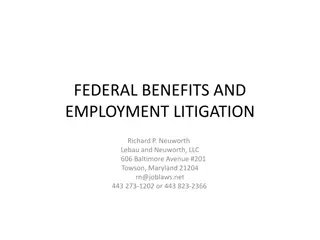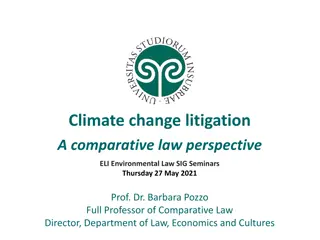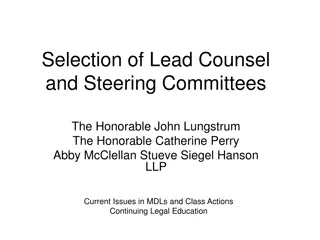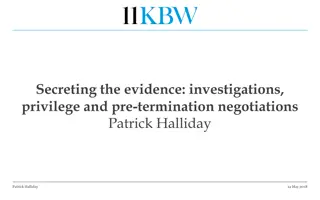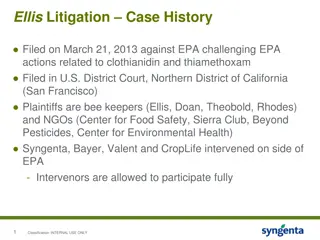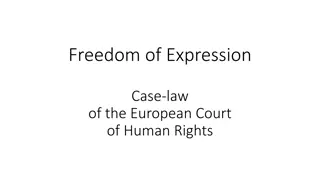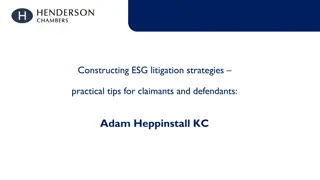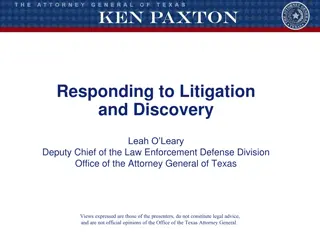Personal Rights in European Climate Litigation
Climate litigation in Europe focuses on individual rights and the shortcomings of traditional governance mechanisms in addressing climate change. The emergence of climate litigation as a crucial tool in governance is driven by the need to protect individuals and specific groups who are disproportionately affected by climate change. Recent European cases highlight the challenges faced in establishing standing for climate-related legal actions and emphasize the importance of incorporating human rights considerations in environmental jurisprudence.
Uploaded on Sep 11, 2024 | 0 Views
Download Presentation

Please find below an Image/Link to download the presentation.
The content on the website is provided AS IS for your information and personal use only. It may not be sold, licensed, or shared on other websites without obtaining consent from the author. Download presentation by click this link. If you encounter any issues during the download, it is possible that the publisher has removed the file from their server.
E N D
Presentation Transcript
Can Climate litigation really get personal? Focus on Rights in the context of the European cases Marta Torre-Schaub IDDRI ISJPS Universit Paris 1 Sciences Po 11 May 2023
Introduction Emergence of climate litigation as a tool box Climate change governance : development of policies and implementation but also Courts Climate change litigation as an important tool for governance recall by the last IPCC report ; Why is that ? Because the most natural delivers of governance : laws and policies, regulations are not able to do it with enough ambition and strength Also because there aspects concerning people, individuals or specific groups that are left behind or not enough take in consideration : specially rights
Governments are often under preassure of electoral timelines, economic interests and others Climate Change Litigation is a bridge before people and climate change laws and rights key arguments, failure to protect people against consequences of CC
1. Key Elements *First and important element is to recall that an application was presented before the Court of Justice of the European Union in 2017, the people s climate case Carvailho, Which was dismissed
Armando Carvailho March 25 th 2021 EUCJ 1) the Court recalled the fact that the appellants, owing to the alleged circumstances, are affected differently by climate change is not in itself sufficient to establish the standing of those appellants to bring an action for annulment of a measure of general application such as the acts at issue. Consequently, the appellants cannot claim that the General Court did not take into account, in the order under appeal, the characteristics specific to them in order to determine whether they were individually concerned. 2) The Court is not convinced by the arguments put forward in their first ground of appeal, the test derived from the judgment in Plaumann for establishing the existence of individual concern should be adapted in order to ensure adequate judicial protection against serious infringements of fundamental rights. It follows that the appellants arguments seeking to have the criterion of individual concern extended cannot, in any event, succeed.
*Second, and turning to the European Convention of human rights, it s important to recall what it convers and what s has been until now the jurisprudence of the Court on environmental matters. 1) The European Court fo Justice is competent to decide under the European Convention of HR 2) One of the main rules of the ECHR is that the domestic appeals must be exhausted 3) the European Convention HR has no specific article concerning a Right to a healthy Environment. But the Court has developed since 1992 a jurisprudence in order to protect human rights in light to a healthy environment under articles 2, 8 and 6 of the Convention
2. Why these cases are important 1) it will be the first cases on climate change before this Court 2) the decisions can have an impact on others courts decisions 3) they can also enhance the States obligations on cc and thus the ICJ could inspire herself for her own opinions 4) obligations of states and human rights related cc : what do states have to do to protect : accepting climate vulnerability as an element of breach to the right of life and the right to a private life and private home ; also to recognise a high standard of the duty of diligence
3. The recognition of rights Presentation of the cases before the ECHR There are presently 10 cases before the E Court of HR. 3 of them are pending Verein KlimaSeniorinnen Schweiz and Others v. Switzerland Car me case v. France Duarte Agostinho and young portuguese v. Portugal and 32 states
Verein KlimaSeniorinnen Schweiz & Others v. Switzerland failure to do necessary to reduce GES and also failure to protect victims (the seniorinen women appliquants if the case) from adversary and negative effects from cc specially consequences of excessive temperatures and illness caused ; thus breach of human rights art 2 and 8 and falure to protect or take measures. The appliquants asked the governement to recalculate their trajectory of reduction They asked the government for a due diligence according to the Paris Agreement 2*C target Also a fearshare between countries The government argued the drop in the Ocean justification The State asked for his freedom about the margin of application the law and measures Main argument : the State said it was an actio popularis and out of the scope of the Court
Carme case v. France After having exhaust all avenues for appeal at the domestic level, Mr. Car me, former mayor of Grande Synthe town applied to the Court for violation of his human rights covered by Articles 2 and 8 of the Convention Failure to take all necessary measures to reduce emissions Failure to take measures to protect his home and live The State : all measures have been taken and that the Conseil d Etat already rueld on that issue concerning the town That a new climate Act has been published since Concerning Mr Car me personnal standingt that he s not living in Grande Synthe for several years now The State responds during the hearing that it s in fact an actio popularis
Duarte Agostinho and young portuguese v. Portugal and 32 states Young, future generations, discrimination, breach of right to live and family and private live, anxiety and frighted because of fires and loss of property, health, possibilities go to shool, education and many illness, insomnia etc. 3 key arguments : -science of cc in the IPCC reports ; The appliquants rely on the evidence of the report ; -failure of states to stay at 1,5 C -legal point : about breaching rights because of dramatic effects
4. What are states doing or (not) doing ? States fail to regulate limits emissions Breaching HR and severe violations of HR from states because of permitting emissions ; permitting activities fossil and contribute to activities of extraction fossil There is no European authority to forbide activities on the basis of Paris Agreement
5. Issues at stake and possible limits for the ECHR To accept the applications not as actio popularis but as individual and/or specific collective group Here particularly tricky because tension between the first aim of the Court (to protect individuals or very precise groups or communities) and cc challenges to all and injuris to all The time : the inminence and seriousness of the cc threaten : the degree of the danger and risk The causality link : between the dangers and the emissions of the states : the drop in the Ocean argument
The Court will have to do an effort to pass over these difficulties and to innove somehow But as cc change negative effetcs are growing and climate cases growing, sooner or later the Court will have to move on and be open to be more flexible in her interpretation of articles 2 and 8 And reconsider the actio popularis argument of the states
6. Elements that could help The recent recognition by the UNGA of a human right to a healty an sustainable environment The latest demand to an advisory opinion to the ICJ by the UNGA in the name of Vanuatu and 193 other States in order ot ask the International Court to state what are the states obligations on cc under international law and in what extent future generations must be protected from cc negative effects in the name of international law and states obligations. The recent advisory opinion asked by Chile to the Interamerican court on cc states obligations and due diligence over future generations.
Conclusions It will be important that all Courts come to substantial decisions and convey in the same direction. Also in the same page to interpret international law, standards of diligence, responsibility and principe of equity between generations and violation of human rights. Also if they rely to Paris Agreement, which interpretation of article about stabilisation of climate system under 2 C. Also which interpretation of bests efforts as a quality standard and more appropriate measures . Nevertheless difficult to came to a Global consensus of all states what they have to do but at least the Courts could show some minimum standards and pathways







